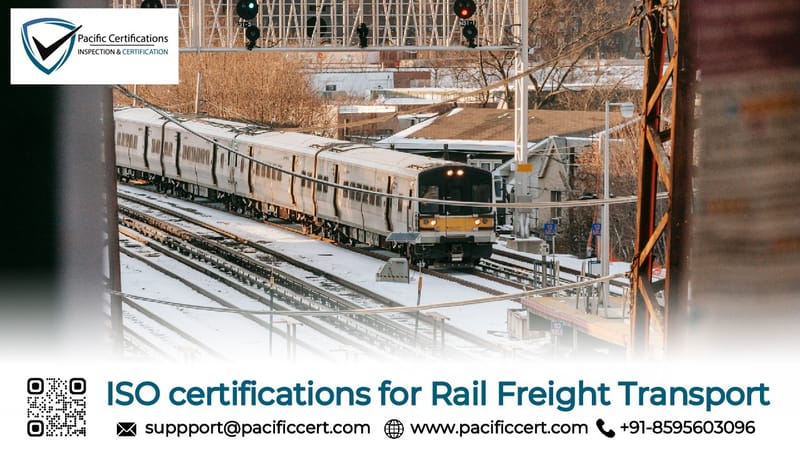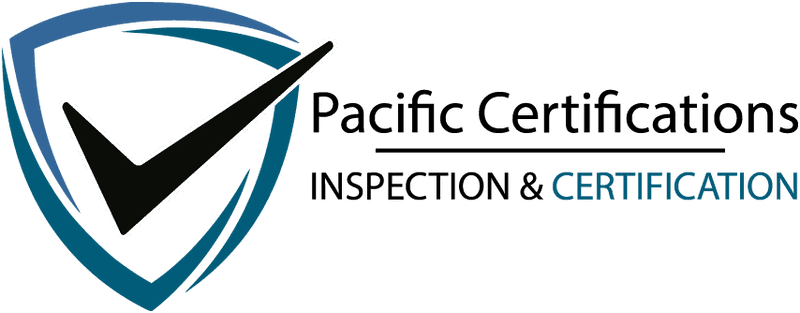ISO Certifications for Rail Freight Transport Services, Requirements and Benefits

Rail freight transport plays a critical role in global logistics, offering an efficient, cost-effective, and environmentally friendly mode of moving goods over long distances. However, like any sector, it faces challenges in maintaining safety, quality, and operational efficiency. This is where ISO certifications become invaluable. The adoption of ISO standards enables rail freight transport companies to streamline operations and align with global best practices.
Get certified with ISO standards tailored for rail freight transport by contacting us at [email protected] or +91-8595603096!
In rail freight transport, adhering to ISO standards ensures that companies meet both regulatory requirements and customer expectations. It also positions rail operators as trustworthy and reliable partners in the supply chain, boosting their reputation in the global market.
Applicable ISO Standards for Rail Freight Transport
Several ISO standards are applicable to the rail freight industry, covering various aspects such as quality, safety, and environmental management. Here are the most relevant ISO standards:
ISO 9001:2015 (Quality Management Systems)
ISO 9001 is one of the most widely adopted standards globally, providing a framework for consistent quality management. It ensures that rail freight companies maintain high levels of service quality, efficiency, and customer satisfaction.
ISO 14001:2015 (Environmental Management Systems)
ISO 14001 focuses on minimizing the environmental impact of business activities. For rail freight transport, this involves reducing carbon emissions, minimizing waste, and optimizing energy consumption.
ISO 45001:2018 (Occupational Health and Safety Management Systems)
ISO 45001 is essential for managing workplace health and safety risks. Rail freight transport involves significant risks related to operations, including accidents, injuries, and exposure to hazardous materials.
ISO 50001:2018 (Energy Management Systems)
ISO 50001 provides a framework for companies to monitor, control, and reduce energy usage, leading to cost savings and reduced environmental impact.
ISO/TS 22163:2017 (Railway Applications - Quality Management System - Business Management System Requirements for Rail Organizations)
This standard is specifically designed for the rail sector. It ensures that rail freight transport companies adhere to the highest standards of safety, quality, and performance.
ISO 14064 provides tools for measuring and managing greenhouse gas emissions. For rail freight operators looking to enhance their sustainability efforts, this standard helps track emissions and implement measures to reduce their carbon footprint.
Click here to find out more applicable standards to your industry
For ISO 45001 and ISO 50001 certifications focused on safety and energy management in rail freight, email [email protected] or call +91-8595603096 for expert assistance.
How We Can Help
At Pacific Certifications, we are committed to assisting rail freight transport companies in achieving ISO certification. As a certification body, we specialize in conducting audits and issuing ISO certificates to organizations that meet the necessary standards.
It is important to note that we do not provide consultancy services, gap analysis, training, or implementation support. Our role is to ensure that your organization complies with the ISO standards through a rigorous and unbiased auditing process.
By choosing Pacific Certifications, you can benefit from:
- Expert audits conducted by experienced professionals
- A thorough evaluation of your processes and systems
- Certification that enhances your company’s reputation and credibility
- Ongoing surveillance audits to ensure continual improvement
We aim to help you achieve ISO certification efficiently, ensuring that you meet all necessary requirements without compromising on quality or safety!
Get your rail freight transport certified with ISO standards like ISO/TS 22163. Contact us at [email protected] or +91-8595603096 for a hassle-free certification process!
Requirements of ISO Standards for Rail Freight Transport
Each ISO standard has specific requirements tailored to its scope. Below are the key requirements for the most applicable ISO standards for rail freight transport:
- ISO 9001:2015 (Quality Management Systems): Rail freight companies must establish a quality management system that includes documented processes for managing operations, customer communication, and continuous improvement. Internal audits and management reviews are essential components to ensure adherence to quality objectives.
- ISO 14001:2015 (Environmental Management Systems): Organizations must assess their environmental impact and implement processes to minimize negative effects. This includes managing waste, reducing emissions, and complying with environmental regulations. Continuous monitoring and regular audits are required to maintain certification.
- ISO 45001:2018 (Occupational Health and Safety Management Systems): Rail operators need to implement a comprehensive health and safety management system that identifies and mitigates risks in the workplace. Employee training, emergency preparedness, and regular safety audits are key elements of ISO 45001 compliance.
- ISO 50001:2018 (Energy Management Systems): Rail freight companies must establish energy management processes to monitor and reduce energy consumption. This involves setting measurable energy performance goals, tracking progress, and continuously improving energy efficiency.
- ISO/TS 22163:2017 (Railway Applications): Organizations must develop a quality management system specific to the rail industry. This includes meeting customer expectations, ensuring operational efficiency, and adhering to safety and regulatory requirements. Regular audits and continual improvement processes are critical.
Ensure your rail freight transport meets ISO 14064 standards for greenhouse gas management. Reach us at [email protected] or call +91-8595603096 for ISO certification.
Benefits of ISO Standards for Rail Freight Transport
Implementing ISO standards offers rail freight transport companies numerous advantages, ensuring that operations are efficient and safe. Below are the key benefits:
- ISO 9001 ensures that companies maintain consistent quality in their operations and services, leading to improved customer satisfaction and retention.
- ISO 9001 certification is recognized globally, making it easier for rail freight companies to partner with international clients and enter new markets.
- ISO 14001 helps rail freight operators identify and manage their environmental impacts, including emissions, waste management, and resource consumption.
- Compliance with environmental laws and regulations is a core component of ISO 14001. Certification ensures that companies meet all necessary environmental standards.
- ISO 45001 focuses on identifying and mitigating workplace hazards, reducing the likelihood of accidents and injuries in the high-risk rail freight environment.
- By adopting ISO 45001, companies create a safety-focused work culture, promoting employee involvement and proactive risk management.
- ISO 50001 provides a framework for systematically improving energy performance, reducing energy consumption, and lowering operational costs in rail freight operations.
- ISO/TS 22163 is tailored to the rail industry, ensuring that rail freight transport companies meet specific requirements related to safety and operational efficiency.
By adopting these ISO standards, rail freight companies can significantly enhance their operational efficiency, safety, and environmental responsibility while ensuring compliance with global regulations and improving their market position.
Reliable Certification Partner: Trust us for your ISO certification needs in rail freight transport. For expert audit and certification services, contact [email protected] or +91-8595603096.
Market News
In this year, the global rail freight transport industry continues to grow, driven by increasing demand for sustainable and efficient logistics solutions. According to recent reports, there is a growing focus on decarbonization and the adoption of energy-efficient technologies.
Rail freight companies are also increasingly adopting digital tools to optimize operations and improve efficiency. ISO certifications are playing a key role in helping rail operators meet the demand for greener and more efficient services.
In terms of trends, rail operators are prioritizing safety and environmental sustainability. Companies are looking to reduce their carbon footprint, and standards like ISO 14064 are becoming more important for tracking and reducing greenhouse gas emissions.
Certification Process
The process of obtaining ISO certification for rail freight transport companies typically involves the following steps:
- Gap Analysis (Optional): Before beginning the certification process, many companies conduct a gap analysis to identify areas where their current operations fall short of ISO requirements.
- Developing a Management System: The company must develop and implement a management system that aligns with the requirements of the desired ISO standard.
- Internal Audit: Before applying for certification, the company should conduct an internal audit to assess the effectiveness of its management system and identify areas for improvement.
- Stage 1 Audit: Pacific Certifications will conduct a preliminary audit to assess the company's readiness for certification. This stage focuses on reviewing documentation and determining whether the company is prepared for the full audit.
- Stage 2 Audit: The full certification audit is conducted to evaluate the company's compliance with ISO requirements. This involves reviewing processes, interviewing employees, and assessing overall performance.
- Certification Issuance: If the company meets all requirements, Pacific Certifications will issue an ISO certificate. This certificate is valid for three years, subject to successful surveillance audits.
- Surveillance Audits: To maintain certification, companies must undergo regular surveillance audits to ensure continued compliance with ISO standards.
- Recertification: After three years, the company must undergo a recertification audit to maintain its ISO certification.
Achieving ISO certification is essential for rail freight transport companies looking to enhance their operational efficiency, safety, and sustainability. Contact us today to learn more about how we can assist your company in meeting global standards and driving continuous improvement in the rail freight industry.
Pacific Certifications is accredited by ABIS, in case you need support with ISO certification for your Rail Freight business, please contact us at [email protected] or +91-8595603096.
FAQs: ISO Certifications for Rail Freight Transport
Q1. What are the most important ISO standards for rail freight transport?
The most relevant ISO standards for rail freight transport include ISO 9001 (quality management), ISO 14001 (environmental management), ISO 45001 (occupational health and safety), ISO 50001 (energy management), and ISO/TS 22163 (rail-specific quality management).
Q2. How long does the ISO certification process take?
The certification process varies depending on the complexity of your operations and the standard being applied for. On average, it can take several months to develop a compliant system, conduct audits, and receive certification.
Q3. Does Pacific Certifications offer consultancy services?
No, Pacific Certifications is a certification body that focuses solely on auditing and certification. We do not provide consultancy, gap analysis, or implementation services.
Q4. What are the benefits of ISO certification for rail freight companies?
ISO certification improves operational efficiency, enhances customer satisfaction, ensures regulatory compliance, reduces costs, and demonstrates a commitment to sustainability and safety.
Q5. How often are surveillance audits conducted?
Surveillance audits are typically conducted annually to ensure continued compliance with ISO standards.
Read More at: Blogs by Pacific Certifications

